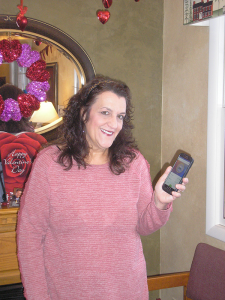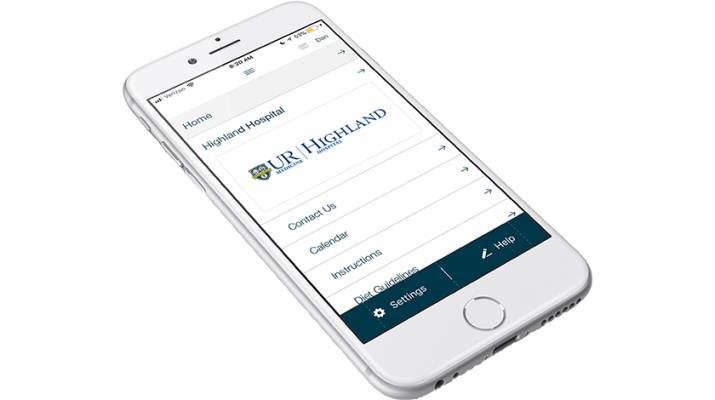Highland Hospital introduces app that helps those who undergo bariatric surgery keep their health (and weight) in check
By Mike Costanza

For those who undergo bariatric surgery, the procedure is just one step on the journey toward dropping the pounds — and keeping them off.
“It’s vitally important to watch your food intake,” says Piera Carubia, a registered dietitian with the Bariatric Surgery Center at Highland Hospital. “If you’re not paying attention on a daily basis to what you’re eating, you’re not going to be able to make significant lifestyle changes not only to maintain the weight loss after surgery, but also to help prevent other problems and diseases.”
Baritastic, a weight loss app that the center’s patients are allowed to access for free, can help them maintain healthy lifestyles for life.
Obesity, characterized by a body mass index of 30 or more, has grown to be a huge problem in the U.S. As of 2014, one in three American adults was obese, according to the National Health and Nutrition Examination Survey. Though many shed excess pounds through a healthier diet, exercise and other lifestyle changes, others who struggle with their weight might use bariatric surgery to begin attacking the problem.
“It reduces the size of the stomach,” Carubia explains. “You’re using a small stomach as a tool to help you feel that fullness faster, leading you to eat less food.”
Patients of the Bariatric Surgery Center must undergo physical and psychological examinations before coming in for surgery.
“Ultrasound on your gall bladder, testing your hemoglobin A1c to make sure you’re not diabetic — these are standards everyone has to check, and there’s multiples of them,” Carubia says. “In addition to that, many people have additional health complications. They would then have to get other checks.”
Individual counseling is also part of the program.
“We work on behavior and lifestyle changes in these sessions, and we give them goals,” Carubia says. “We’re a very structured program.”
In addition, patients must attend a nutritional program geared toward healthy eating and keep a food journal. They note what they eat, how much they consume and other facts.
Altogether, preparation for bariatric surgery takes about six months. Patients begin seeing the operation’s effects quickly.
“They’ll lose most of their weight in the first year,” Carubia explains. “After that, their job is to maintain that weight loss.”
Tracking nutrition, exercise, inches lost
Following surgery, the Bariatric Surgery Center’s staff will sit down with patients for follow-up appointments. Patients are also encouraged to continue food journaling, and practicing other lifestyle changes that could help them become or remain healthier. There’s even a support group, Monarch Monthly, to which those who have undergone the procedure can come with their families and friends.
As attractive as the idea of losing weight can be for bariatric surgery patients, the steps to take to prepare for the operation, to lose weight after it is completed and to keep those pounds off requires a great deal of attention.
“A lot of people get very confused, because there’s so many checks and balances in the program to do,” Carubia says. “It can be very overwhelming.”
Baritastic is designed to help patients avoid that confusion.
“It’s essentially an app for bariatric patients to track everything pre-and-post-operatively from nutrition to exercise to inches lost to taking photos of their progress etc.,” says Dan Abeling, president of Texas-based NBL Media LLC, which created the app.
The overall purpose of Baritastic is to better educate bariatric surgery patients.
“Your diet guidelines are in there, discharge instructions are typically in there, best practices, calendar of support groups etc.” Abeling explains. “We also have a checklist section where your program can set up a checklist for you to follow so you can get to surgery.”
The checklists can be customized to fit the needs of individual patients. A patient who has suffered kidney damage, for example, would have to check off the obtaining of clearance from a nephrologist before undergoing surgery.
Baritastic also allows patients to note their attendance of the nutritional program, when and how much they have exercised, and the other tasks that comprise a healthy weight loss regime. Best of all, they can write their food journals on their phones, and give the surgical center’s dietitians access to them.
“Say, they had a question about something they ate,” Carubia says. “We can go in and access that data.”
With that in hand, dietitians are more able to give patients the guidance and encouragement they need. Baritastic can also remind patients to take vitamins and supplements, and to attend upcoming support group meetings.
“Best thing I ever did”
By 2017, Vivian Roseto had had enough of coping with her situation.
“I battled my weight since I was in high school,” the 53-year-old Gates resident says. “I was just getting older, and tired of it.”
Moreover, the dental office manager was beginning to feel the physical effects of having a BMI of 51. Both her right knee and her back ached very badly, especially when she was at her second job in a florist’s shop.
“It was very hard to stand all day,” she says.”
In early May, Roseto underwent a vertical sleeve gastrectomy. The surgery removed a large part of her stomach, leaving her with a banana-shaped organ. Since then, she has dropped 105 pounds, giving her a BMI of about 32.
“It’s the best thing I ever did,” Roseto says.
Roseto began accessing the Baritastic app on her Samsung Galaxy S4 Smartphone right after undergoing surgery.
“You walk right after surgery — they get you up,” Roseto explains. “From day one, I calculated how long I walked.”
Nowadays, Roseto tries to head to the gym three times a week, where she mounts the elliptical machine and lifts weights. She closely monitors her activities and diet, and uses the Baritastic app to note when she exercises and what she consumes on her phone.
“It’s just a great way for me to…keep track of my calories, how many liquids I’m having, what types of foods I’m having,” Roseto says.
By early February, her BMI had dropped to 32.8. Though Roseto plans to continue her exercise and dietary regimens, she isn’t concerned about losing more weight.
“If I stay like this, I’m happy,” she says. “If I lose some more, I’m happy.”

